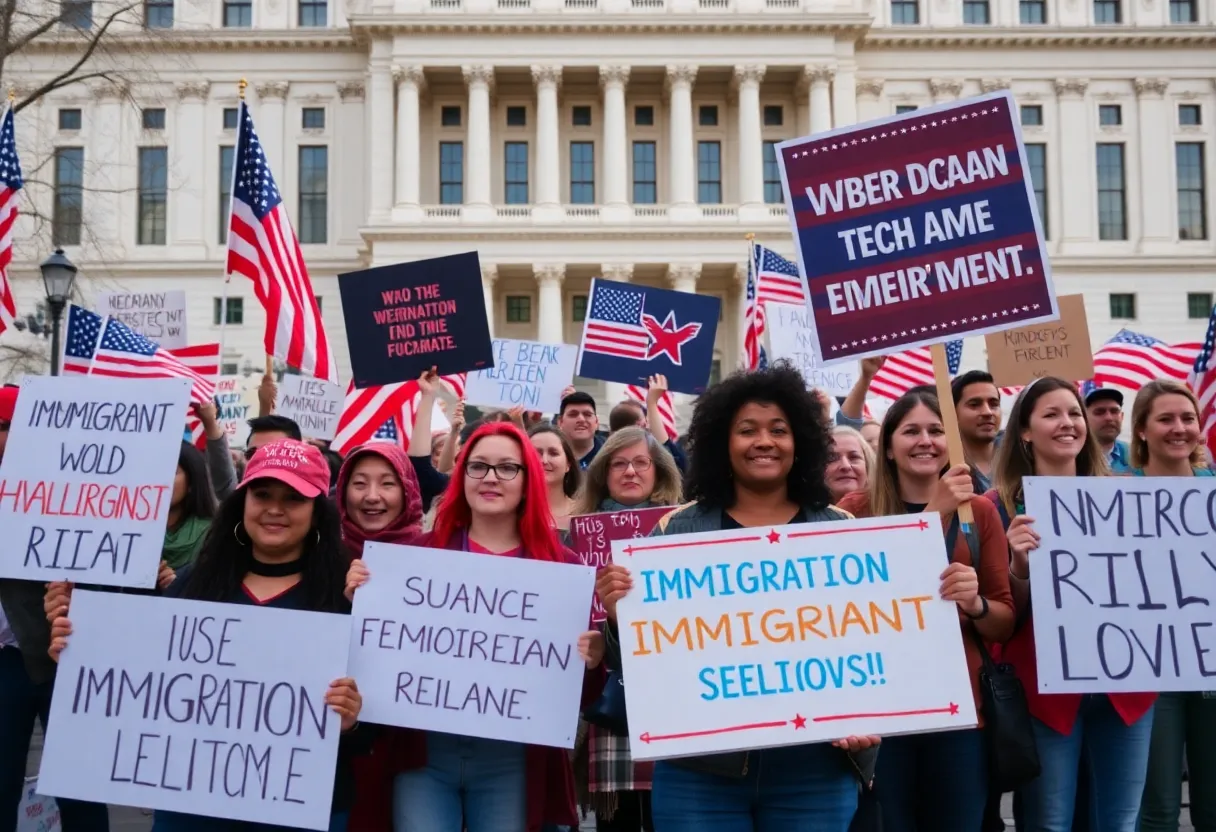

Protests erupt across the country as citizens voice their opposition to the Trump administration's immigration policy changes.
The Trump administration is set to revoke legal status for over 1.8 million migrants, including individuals from Haiti, Venezuela, and Ukraine. This decision, impacting more than 530,000 migrants warned to leave by April 24, raises significant humanitarian and legal concerns. Critics and experts warn that the reversal of protective measures could lead to severe consequences, including legal battles, economic instability, and strain on diplomatic relations. Protests are already underway, signaling widespread dissent against this policy change.
The Trump administration has shaken up the immigration landscape by announcing plans to revoke legal status for more than 1.8 million migrants, which includes individuals from countries like Cuba, Haiti, Nicaragua, Venezuela, and Ukraine. This significant move is raising eyebrows and sparking extensive discussions about humanitarian and legal implications.
The new policy means that over 530,000 migrants are being warned to leave the United States by April 24, or risk losing their permits and protective measures against deportation. These migrants initially gained temporary legal status through a program known as CHNV, which was introduced under President Biden in 2022. The CHNV program aimed to create legal pathways for migrants who had American sponsors, allowing them to live in the U.S. for two years.
To put this into perspective, approximately 213,000 Haitians, over 120,700 Venezuelans, around 110,900 Cubans, and more than 93,000 Nicaraguans were included in this initiative before the Trump administration opted to halt it.
Supporters of the Biden administration have argued that the CHNV program was critical in helping to control illegal border crossings and ensure better vetting of individuals entering the country. In contrast, the Department of Homeland Security (DHS) recently criticized the previous administration’s policies, asserting that the CHNV program failed its intended goals. They expressed that it had inadvertently contributed to job competition and, in some cases, fraud.
While some migrants might still be able to remain in the U.S. based on individual circumstances, the overall policy change is stirring uncertainty and concerns among those affected. Additionally, Trump is eyeing a cancelation of temporary legal status for about 240,000 Ukrainians who fled their home country amid the ongoing conflict with Russia. Furthermore, revocation of Temporary Protected Status (TPS) for about 500,000 Haitians was previously announced, adding even more layers of complexity to the already tumultuous situation.
The announcement has triggered protests, and legal battles are unfolding all across the country. Many experts are cautioning that if these deportations proceed, they could lead to severe legal, economic, and humanitarian consequences, particularly given the ongoing instability in the migrants’ home countries.
Legal challenges are already stacking up against Trump’s fresh immigration policies, with critics alleging they breach the Administrative Procedure Act and contradict international law norms. There are growing worries that these potential deportations could put a strain on diplomatic relations, especially concerning commitments like the Budapest Memorandum regarding Ukraine.
Critics are also raising ethical concerns about the fate of migrants who have integrated into American society and contribute significantly to various sectors. There’s a collective fear around the economic impacts of catapulting these individuals back to their unstable home countries.
Moreover, voices from both sides of the political aisle in Congress have expressed major concerns regarding how these changes might affect the overall immigration landscape. The possibility of large-scale deportations raises further questions about the burden on neighboring nations like Canada and Mexico, which could see an influx of asylum seekers as families are uprooted.
As the Trump administration promotes a newfound focus on stricter “enhanced vetting” measures, it appears that those expressing any dissent against U.S. policies will be scrutinized even more closely. This not only renders real implications for civil rights but leaves many wondering about the future of immigration policy and the values that shape it.
Stay tuned, as this situation continues to evolve, and the potential impacts on millions hang in the balance.
News Summary A federal jury in Denver has ruled that Mike Lindell, founder of MyPillow,…
News Summary The Department of Homeland Security has reversed its stance, allowing ICE to target…
News Summary The shocking assassination of Democratic state Representative Melissa Hortman and her husband Mark…
News Summary Escalating tensions between Israel and Iran have raised concerns over potential military action.…
News Summary The Atlanta City Council has voted to approve a $10 million skybridge project…
News Summary BMI hosted an exclusive mixer to celebrate Black Music Month, featuring R&B singer-songwriter…